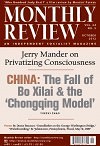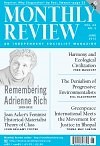Media

In universities today research, promotion, and tenure are increasingly based on publication in peer-reviewed academic journals. These journals are supposed to constitute the highest level of intellectual inquiry in the disciplines they represent. Yet, they are being transformed more and more into commodities subject to capitalist market conditions, subverting their purpose. Academic journal publication is now an oligopolistic industry with the five biggest commercial publishers accounting for about 40 percent of a $10 billion sector. Commercial academic journal publishers charge between three and nine times as much per page as scholarly society journals. Between 1970 and 1997 academic journal prices increased by a factor of thirty, growing by an average annual rate of more than 13 percent. Consequently, commercial publishers in this sector are currently reaping outsized profit margins on the order of 30–40 percent.… Given the growing monopolistic nature of academic journal publishing conflicts are inevitably deepening between the editors and authors, on the one hand, and the corporations that publish these journals, on the other. | more…
Is advertising legal? Most people agree that it is an uninvited intrusion into our lives and our minds, an invasion of privacy. But the fact that we can be aware of this without being furious, and that we do little to change the situation, is a good measure of our level of submission. There is a power relationship in advertising that is rarely, if ever, looked at, and yet it is a profoundly corrupt one. Some speak; others listen.… A. J. Liebling famously said, “Freedom of the press is guaranteed, but only if you own one.” Freedom of speech is also guaranteed. But only if you have a few million dollars for an effective media strategy. Soapbox oratory doesn’t sway the public anymore. But the powers of advertising go well beyond the amount of money spent. The true power is in the nature of moving-image media, projected for hours every day into human brains. It’s a form of intrusion we have never before in history had to face. Even now in the Internet age, the powers of television and advertising are undiminished and insufficiently examined or discussed. | more…
Denise Bergman is the author of Seeing Annie Sullivan (Cedar Hill, 2005), and the forthcoming The Telling. An excerpt of her poem “Red,” about a slaughterhouse in the neighborhood, is permanently installed as public art. Her website is http://denisebergman.com. | more…
Marge Piercy is the author of eighteen poetry books, most recently The Hunger Moon: New & Selected Poems, 1980–2010 from Knopf. Her most recent novel is Sex Wars (Harper Perennial) and PM Press has republished Vida and Dance the Eagle to Sleep with new introductions. | more…
Cuba is remaking medicine in a remarkable diversity of cultures in Latin America, the Caribbean, Africa, Asia, and the Pacific Islands. Its efforts go far beyond providing medical care to other parts of the world as a Western approach might limit itself to doing. The Cuban project develops bilateral agreements with host countries to rethink, redesign, and recreate medicine. | more…

By any measure, Adrienne Rich lived an exemplary life. When she died last March 27, aged eighty-two, she was acknowledged by many critics as perhaps this country’s foremost poet.… Throughout her writing life, Adrienne Rich’s vision of a better world was clear. In her 2008 collection A Human Eye: Essays on Art in Society Rich claimed Che Guevara, Karl Marx, and Rosa Luxemburg as defining heroes. It did not matter if she was speaking to a room full of undergraduates or, having made the long painful climb up the hill to the Women’s Correctional Facility in Bedford Hills, New York, to teach poetry to its inmates, Adrienne’s voice was trenchant. So it was not surprising that when the commercial media ran obituaries of her, they sanitized her life and work, giving more emphasis to her awards than her work, characterizing her as angry rather than radical. At MR however, we preferred to hear her words: “Responsibility to yourself means refusing to let others do your thinking, talking, and naming for you; it means learning to respect and use your own brains and instincts; hence, grappling with hard work” (from “Claiming an Education,” 1977). | more…
Essay & Poems in Remembrance of Adrienne Rich
Our senses are currently whip-driven by a feverish new pace of technological change. The activities that mark us as human, though, don’t begin, exist in, or end by such a calculus. They pulse, fade out, and pulse again in human tissue, human nerves, and in the elemental humus of memory, dreams, and art, where there are no bygone eras. They are in us, they can speak to us, they can teach us if we desire it.… In fact, for Westerners to look back on 1900 is to come full face upon ourselves in 2000, still trying to grapple with the hectic power of capitalism and technology, the displacement of the social will into the accumulation of money and things. “Thus” (Karl Marx in 1844) “all physical and intellectual senses (are) replaced by the simple alienation of all these senses, the sense of having.” We have been here all along. | more…
In his estimable Robin Hood: People’s Outlaw and Forest Hero, it is Paul Buhle’s contention that in the almost eight centuries of his legendary existence, Robin has had his time come periodically but seldom more than now. With barbarians, foreign and domestic, at the gates whenever they are not in the palaces, the need for heroes to rise from the ranks of the masses is at least as urgent as it was in Robin Hood’s day.… Buhle argues that the world needs Robin Hood now more than ever. “We need Robin because rebellion against deteriorating conditions is inevitable….” | more…
The United States is in the midst of its quadrennial presidential election, a process that now extends so long as to be all but permanent. The campaign is also drenched in more money given by a small handful of billionaires than has been the case in the past. Since the 1970s the amount spent on political campaigns has increased dramatically in almost every election cycle. It has led to the formation of what we term the “money-and-media election complex,” which has a revenue base in the many billions of campaign dollars donated annually, and has effectively become the foundation of electoral politics in the United States. Moreover, the rate of increase in campaign spending from 2008 to 2010, and especially from 2008 to 2012, is now at an all-time high. | more…
Gregory Sholette, Dark Matter: Art and Politics in the Age of Enterprise Culture (London: Pluto Press, 2011), 240 pages, $30.00, paperback.
Class struggle is the last thing most people would associate with Alfred Hitchcock, probably the most famous director of them all. But there is a connection, nevertheless. No one would call Hitchcock a socialist; he emphasized that all he wanted was to entertain people—not instruct them. He was proud of his commercial success (and so were the studios that employed him).… For many, it will sound absurd to claim that Hitchcock has anything to do with class struggle. It is an interesting reaction, because issues that are a function of class struggle are plainly on view in Hitchcock, even if they are ignored—or blocked out. Many of his movies are built around class-struggle issues: without them, there would be no movie. | more…
In The Diary of a Young Girl—one of the most touching books ever written about life under fascism—Dutch teenager Anne Frank observed, “Extraordinary things happen to people who go into hiding.” Published in 1947 with an introduction by Eleanor Roosevelt, Frank’s diary awakened the world to the daily lives of Jews hoping to escape concentration camps and gas ovens. Frank’s story was sentimentalized on stage and in the Hollywood movie, but the book itself resonated—it still does—with gritty realism and the kinds of details that just will not die.… That same year, 1947, saw the publication of Every Man Dies Alone, the last novel to be written by Hans Fallada, the lost man of twentieth-century Germany literature. Like Frank’s Diary, Fallada’s Every Man alerted readers around the world to the corrosive force of fascism and the extraordinary things that happen to people in hiding. The main characters are not Jews; they are neither religious, nor do they spout Marx, Engels, or Rosa Luxemburg. Every Man presents a series of interwoven narratives about fascism that do not echo the dominant stories that have been told and retold since the end of the Second World War. | more…

